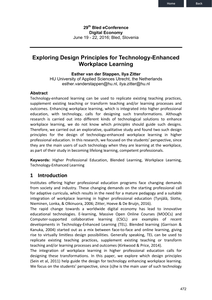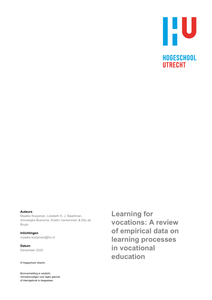From the article: "Abstract, technology-enhanced learning can be used to replicate existing teaching practices, supplement existing teaching or transform teaching and/or learning process and outcomes. Enhancing workplace learning, which is integrated into higher professional education, with technology, calls for designing such transformations. Although research is carried out into different kinds of technological solutions to enhance workplace learning, we do not know which principles should guide such designs. Therefore, we carried out an explorative, qualitative study and found two such design principles for the design of technology-enhanced workplace learning in higher professional education. In this research, we focused on the students' perspective, since they are the main users of such technology when they are learning at the workplace, as part of their study in becoming lifelong learning, competent professionals."
DOCUMENT

From the article: "The goal of higher professional education is to enable students to develop into reflective practitioners, having both a firm theoretical knowledge base as well as appropriate, professional attitudes and skills. Learning at the workplace is crucial in professional education, because it allows students to learn to act competently in complex contexts and unpredictable situations. Reflection on learning during an internship is hard to interweave with the working process, which may easily result in students having little control over their own learning process while at work. In this study, we aim to discover in what way we can effectively use technology to enhance workplace learning, by synthesizing design propositions for Technology- Enhanced Workplace Learning (TEWL). We conducted design-based research which is cyclic in nature. Based on preliminary research, we constructed initial design propositions and developed a web-based app (software program for mobile devices) providing interventions based on these propositions. In a pilot study, students from different educational domains used this app to support their workplace learning. We evaluated the initial design propositions by carrying out both a theoretical and a practical evaluation. With the insights obtained from these evaluations, we developed a next version of the design propositions and improved the app accordingly. The research result is a set of design propositions for TEWL. For daily practice, the developed web-based app is available for re-use and further research and development."
DOCUMENT

To cope with changing demands from society, higher education institutes are developing adaptive curricula in which a suitable integration of workplace learning is an important factor. Automated feedback can be used as part of formative assessment strategies to enhance student learning in the workplace. However due to the complex and diverse nature of workplace learning processes, it is difficult to align automated feedback to the needs of the individual student. The main research question we aim to answer in this design-based study is: ‘How can we support higher education students’ reflective learning in the workplace by providing automated feedback while learning in the workplace?’. Iterative development yielded 1) a framework for automated feedback in workplace learning, 2) design principles and guidelines and 3) an application prototype implemented according to this framework and design knowledge. In the near future, we plan to evaluate and improve these tentative products in pilot studies. https://link.springer.com/chapter/10.1007/978-3-030-25264-9_6
DOCUMENT
Purpose – The hospitality industry creates a distinctive context in which learning takes place. The industry’s international perspective and large globalisation play an important role in learning, as well as the operational and structural features that give meaning to learning and development in the hospitality industry. This explorative research therefore studies the relation between workplace learning and organisational performance in the Dutch hospitality industry. Design/methodology/approach – The qualitative research is done through 15 in-depth interviews with general managers and HR managers of Dutch hotels with three or more stars and at least ten employees. Findings – It can be concluded that there is a relation between workplace learning and organisational performance in the hospitality industry, as the participants in this research and the literature both mention workplace learning enhances organisational performance. Originality/value – Little research has been done on learning and organisational performance specifically, in the (Western) hospitality industry. This research therefore focusses on HRD and studies the influence of workplace learning on organisational performance in the Dutch hospitality industry.
DOCUMENT

A presentation about a skills gap: industry demands versus learning outcomes. The presentation deals with ongoing research about workplace learning in computing curricula.
DOCUMENT

https://www.researchgate.net/publication/323361454_Design_Implementation_of_Technology-Enhanced_Workplace_Learning/references DOI: 10.13140/RG.2.2.26079.56489
DOCUMENT
Posterbijdrage conferentie EARLI SIG 14, 11-14 september 2018, Genève Although literature shows the important supportive role of experienced colleagues to stimulate novices’ workplace learning, the question of how this support is provided is usually answered in general terms (e.g. Mikkonen et al. 2017; Tynjälä 2008). Therefore, this study aims to explore how members of vocational communities, both individually and as a collective, enact specific pedagogic practices to contribute to novices’ learning. The systematic literature review that will be presented in the interactive poster session is the first study of a PhD project and provides an overview of situational pedagogic practices which attempt to support novices’ learning at the workplace.
DOCUMENT

Paperbijdrage conferentie EARLI SIG 14, 11-14 september 2018, Genève Although professional performance at the workplace is essential in VET, little is known about what educators do when assessing students’ performance. This study aims to explore how workplace educators inform their judgements of students’ performance by looking at strategies and potentially influencing factors.
DOCUMENT

Change has become continuous, and innovation is a primary approach for hospitality, i.e., hotel companies, to become or remain economically viable and sustainable. An increasing number of management researchers are paying more attention to workplace rather than technological innovation. This study investigates workplace innovation in the Dutch hotel industry, in three- and four-star hotels in the Netherlands, by comparing them to other industries. Two samples were questioned using the Workplace Innovation survey created by the Dutch Network of Social Innovation (NSI). The first was conducted in the hospitality industry, and these data were compared with data collected in a sample of other industries. Results suggest that greater strategic orientation on workplace innovation and talent development has a positive influence on four factors of organizational performance. Greater internal rates of change, the ability to self-organize, and investment in knowledge also had positive influences on three of the factors—growth in revenue, sustainability, and absenteeism. Results also suggest that the hospitality industry has lower workplace innovation than other industries. However, no recent research has assessed to what degree the hospitality industry fosters workplace innovation, especially in the Netherlands. Next to that, only few studies have examined management in the Dutch hotel industry, how workplace innovation is used there, and whether it improves practices.
DOCUMENT

This article reports on a literature review on empirical research investigating learning for vocations in the context of vocational education. We included 36 studies in which learning for vocations is empirically studied. Learning for vocations is characterised based upon prevalent research traditions in the field and framed from the perspective of vocational education and organised learning practices. This framing and characterisation directed the search terms for the review. Results show empirical data on vocational learning and illustrate how learning processes for the functions of vocational education - vocational identity development, development of a vocational repertoire of actions, and vocational knowledge development - actually take place. The review further shows that, empirical illustrations of learning processes that occur in the context of vocational education and organised learning practices are relatively scarce. The findings can be typified in relation to our theoretical framework in terms of three learning processes, that is learning as a process of (a) belonging, becoming, and being, (b) recontextualization, and (c) negotiation of meaning and sense-making. We argue that more empirical research should be carried out, using the functions of vocational education and the three learning processes to better understand vocational learning.
DOCUMENT
